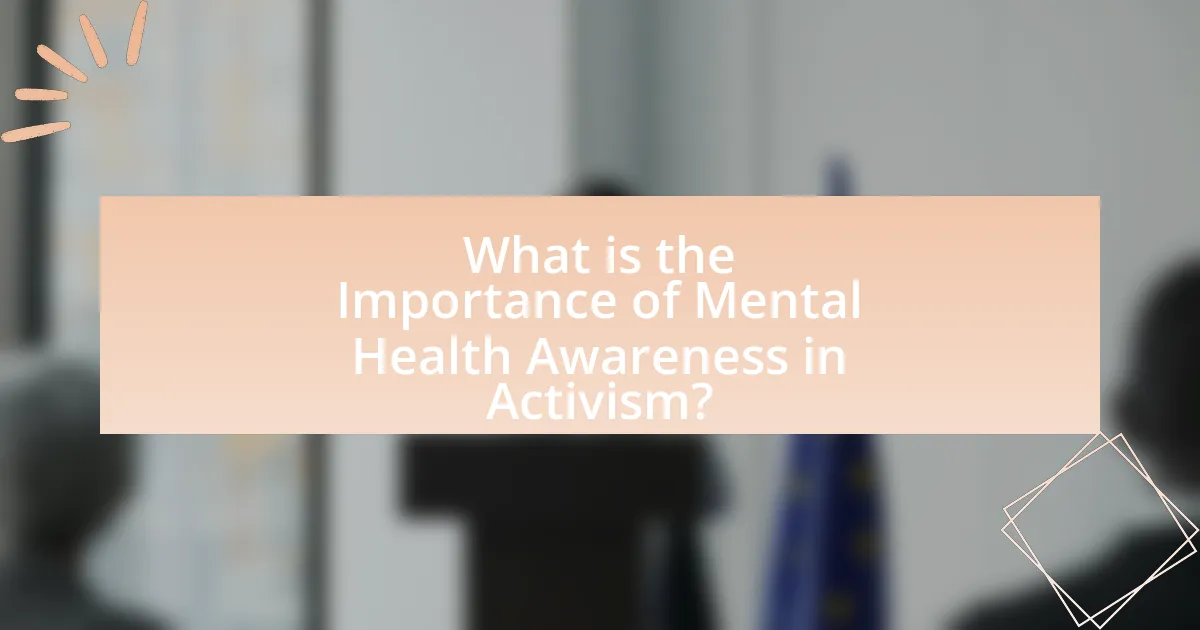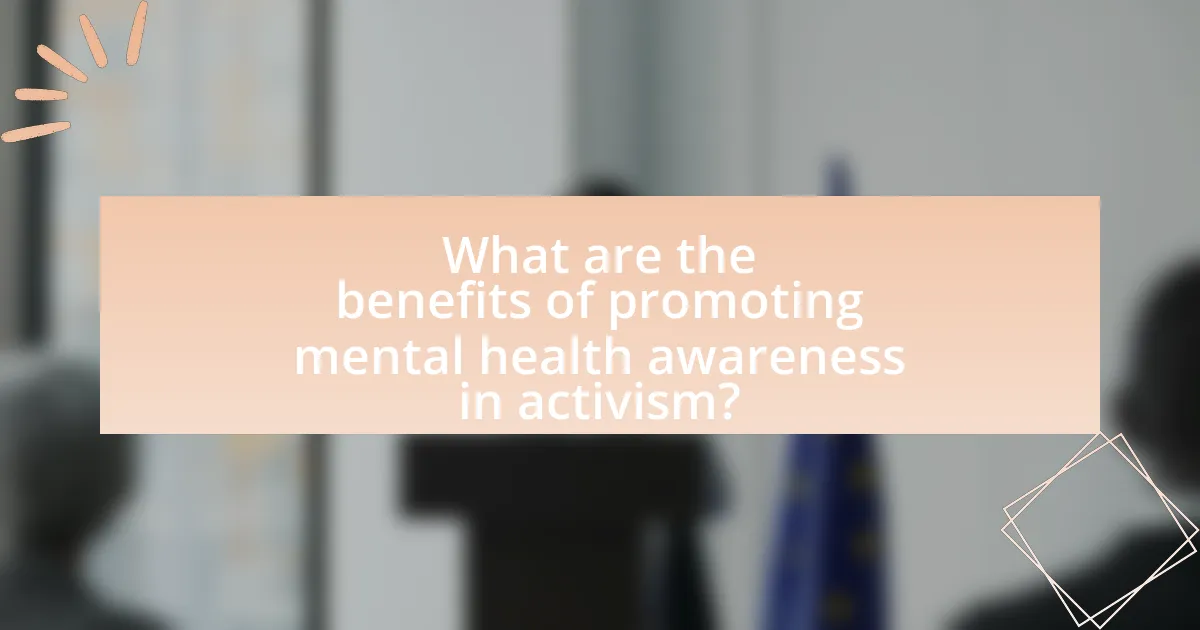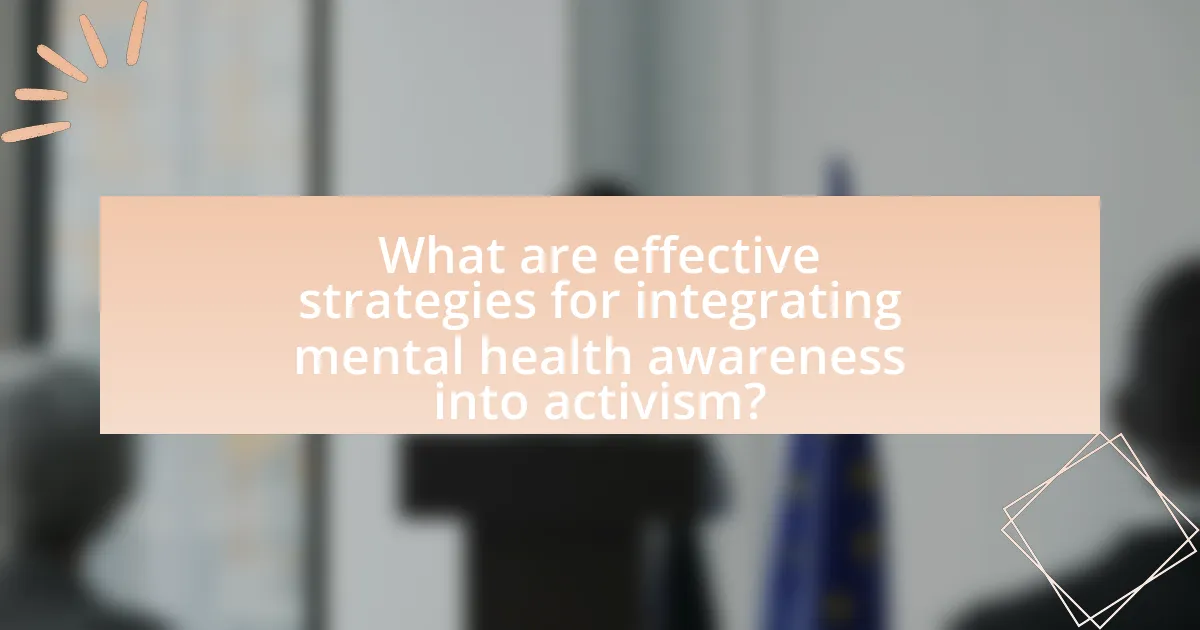The article focuses on the significance of mental health awareness in activism, emphasizing its role in fostering a supportive environment for activists and the communities they serve. It highlights the prevalence of mental health challenges among activists, with research indicating that a significant percentage experience issues such as anxiety, depression, and burnout. The article discusses how prioritizing mental health can enhance resilience, improve group dynamics, and ultimately lead to more effective and sustainable activism. Additionally, it outlines strategies for integrating mental health awareness into activist practices, including training programs, peer support systems, and accessible resources for mental health services.

What is the Importance of Mental Health Awareness in Activism?
Mental health awareness is crucial in activism because it fosters a supportive environment that addresses the psychological well-being of activists and the communities they serve. Activism often involves high levels of stress, trauma, and emotional labor, which can lead to burnout and mental health issues. By prioritizing mental health awareness, activists can create strategies to cope with these challenges, ensuring sustained engagement and effectiveness in their causes. Research indicates that 61% of activists report experiencing mental health challenges, highlighting the need for awareness and support systems within activist movements. This focus not only enhances individual resilience but also strengthens collective efforts, making activism more impactful and sustainable.
Why is mental health awareness crucial for activists?
Mental health awareness is crucial for activists because it directly impacts their effectiveness and sustainability in advocating for social change. Activists often face high levels of stress, burnout, and emotional fatigue due to the nature of their work, which can lead to mental health challenges. Research indicates that approximately 40% of activists experience mental health issues, highlighting the need for awareness and support systems. By prioritizing mental health, activists can maintain their resilience, enhance their decision-making abilities, and foster a supportive community that encourages open discussions about mental well-being. This awareness not only benefits the individual activists but also strengthens the overall movement by ensuring that advocates are mentally equipped to face challenges and continue their work effectively.
How does mental health impact the effectiveness of activism?
Mental health significantly impacts the effectiveness of activism by influencing activists’ resilience, motivation, and overall well-being. When individuals experience mental health challenges, such as anxiety or depression, their ability to engage consistently in activism can diminish, leading to burnout and reduced participation. Research indicates that activists with poor mental health may struggle to maintain focus on their goals, communicate effectively, and collaborate with others, which are essential components of successful activism. For instance, a study published in the Journal of Community Psychology found that mental health support within activist groups enhances group cohesion and individual commitment, ultimately leading to more impactful outcomes.
What are the common mental health challenges faced by activists?
Activists commonly face mental health challenges such as anxiety, depression, burnout, and trauma. These issues arise due to the high levels of stress associated with advocating for social change, often leading to feelings of helplessness and emotional exhaustion. Research indicates that activists are at a greater risk for mental health disorders due to the constant exposure to social injustices and the emotional toll of their work. For instance, a study published in the Journal of Social Issues highlights that prolonged engagement in activism can lead to significant psychological distress, emphasizing the need for mental health support within activist communities.
How does mental health awareness influence social movements?
Mental health awareness significantly influences social movements by fostering a greater understanding of mental health issues, which leads to increased advocacy and support for affected individuals. This awareness helps to destigmatize mental health conditions, encouraging individuals to speak out and share their experiences, thereby mobilizing communities around shared struggles. For instance, campaigns like Mental Health Month and initiatives by organizations such as the National Alliance on Mental Illness have successfully raised public consciousness, resulting in legislative changes and increased funding for mental health services. These movements demonstrate that when mental health is prioritized, it can catalyze broader social change, as seen in the integration of mental health discussions within movements for social justice and equality.
What role does mental health play in community engagement?
Mental health significantly influences community engagement by affecting individuals’ ability to participate actively and meaningfully in community activities. When individuals experience positive mental health, they are more likely to engage in social interactions, volunteerism, and civic participation, which strengthens community bonds. Conversely, poor mental health can lead to social withdrawal and decreased participation, undermining community cohesion. Research indicates that communities with higher levels of mental well-being report greater levels of engagement and collaboration, as seen in studies conducted by the World Health Organization, which highlight the correlation between mental health and social capital.
How can mental health awareness enhance solidarity among activists?
Mental health awareness can enhance solidarity among activists by fostering a supportive environment that acknowledges the emotional challenges faced in activism. When activists understand and prioritize mental health, they create a culture of empathy and shared experiences, which strengthens their collective resolve. Research indicates that groups with high emotional intelligence and awareness of mental health issues are more cohesive and effective in their efforts, as they can better support one another during stressful times. For instance, a study published in the Journal of Community Psychology found that peer support significantly improves resilience among activists, leading to increased collaboration and unity in their causes.

What are the benefits of promoting mental health awareness in activism?
Promoting mental health awareness in activism leads to increased understanding and support for mental health issues, ultimately reducing stigma. This awareness fosters a more inclusive environment where individuals feel safe to discuss their mental health challenges. Research indicates that stigma reduction can improve help-seeking behaviors; for instance, a study published in the “Journal of Mental Health” found that public campaigns significantly increased the likelihood of individuals seeking mental health services. Additionally, mental health awareness in activism can mobilize community resources and support systems, enhancing overall societal well-being.
How does mental health awareness improve activist resilience?
Mental health awareness improves activist resilience by equipping individuals with the knowledge and tools to manage stress and emotional challenges associated with activism. This awareness fosters a supportive environment where activists can openly discuss mental health issues, reducing stigma and encouraging help-seeking behaviors. Research indicates that when activists are educated about mental health, they are more likely to engage in self-care practices, which enhances their ability to cope with setbacks and maintain motivation. For instance, a study published in the Journal of Community Psychology found that mental health training for activists led to increased resilience and sustained engagement in their causes, demonstrating the direct correlation between mental health awareness and activist resilience.
What strategies can activists use to build mental resilience?
Activists can build mental resilience by practicing self-care, establishing supportive networks, and engaging in mindfulness techniques. Self-care strategies, such as regular exercise, adequate sleep, and healthy nutrition, have been shown to improve mental health and enhance resilience. Establishing supportive networks allows activists to share experiences and receive emotional support, which is crucial for coping with stress and burnout. Mindfulness techniques, including meditation and deep-breathing exercises, have been proven to reduce anxiety and improve emotional regulation, thereby strengthening mental resilience. Research indicates that these strategies collectively contribute to better mental health outcomes for individuals in high-stress environments, such as activism.
How does resilience contribute to long-term activism success?
Resilience significantly contributes to long-term activism success by enabling activists to withstand setbacks and maintain motivation over time. This quality allows individuals to adapt to challenges, recover from failures, and persist in their efforts despite obstacles. Research indicates that resilient activists are more likely to engage in sustained efforts, as they can manage stress and avoid burnout, which are common in high-pressure advocacy environments. For instance, a study published in the Journal of Community Psychology found that resilience is linked to greater commitment and effectiveness in social movements, highlighting its role in fostering enduring activism.
What positive outcomes arise from prioritizing mental health in activist spaces?
Prioritizing mental health in activist spaces leads to enhanced resilience and sustainability among activists. When mental health is prioritized, individuals experience reduced burnout and increased motivation, which are crucial for long-term engagement in activism. Research indicates that supportive environments that address mental health can improve group cohesion and collaboration, fostering a sense of community. For instance, a study published in the Journal of Community Psychology found that organizations focusing on mental well-being reported higher levels of member satisfaction and retention. This demonstrates that prioritizing mental health not only benefits individuals but also strengthens the overall effectiveness of activist movements.
How can mental health awareness reduce burnout among activists?
Mental health awareness can significantly reduce burnout among activists by promoting self-care practices and fostering supportive communities. When activists are educated about mental health, they can recognize the signs of stress and burnout early, allowing them to take proactive measures such as seeking help or adjusting their workloads. Research indicates that 40% of activists experience burnout due to high emotional demands and lack of support, highlighting the need for mental health resources. By integrating mental health awareness into activism, organizations can create environments that prioritize well-being, ultimately leading to sustained engagement and effectiveness in their causes.
What impact does mental health awareness have on group dynamics?
Mental health awareness significantly enhances group dynamics by fostering open communication and reducing stigma among members. When individuals are educated about mental health, they are more likely to empathize with one another, leading to increased trust and collaboration within the group. Research indicates that teams with high mental health awareness experience improved cohesion and productivity, as members feel safer to express their concerns and seek support. For instance, a study published in the Journal of Occupational Health Psychology found that organizations promoting mental health awareness reported a 25% increase in employee engagement and a 30% decrease in absenteeism, demonstrating the positive effects on group dynamics.

What are effective strategies for integrating mental health awareness into activism?
Effective strategies for integrating mental health awareness into activism include incorporating mental health education into training programs, utilizing social media campaigns to spread awareness, and collaborating with mental health organizations. Training programs that focus on mental health can equip activists with the knowledge to address mental health issues within their communities, fostering a supportive environment. Social media campaigns can reach a broad audience, raising awareness and reducing stigma associated with mental health. Collaborating with established mental health organizations can provide resources and expertise, ensuring that activism efforts are informed and effective. These strategies are supported by research indicating that awareness initiatives can significantly improve public understanding and reduce stigma surrounding mental health issues.
How can organizations promote mental health awareness among activists?
Organizations can promote mental health awareness among activists by implementing targeted training programs and workshops that focus on mental health education and self-care strategies. These initiatives can provide activists with the necessary tools to recognize mental health challenges and develop coping mechanisms. Research indicates that training programs can significantly improve mental health literacy, enabling individuals to better support themselves and their peers. For instance, a study published in the Journal of Mental Health found that participants who underwent mental health training reported increased awareness and reduced stigma surrounding mental health issues. By fostering an environment of understanding and support, organizations can enhance the overall well-being of activists, ultimately leading to more sustainable activism efforts.
What training programs are available for mental health education in activism?
Training programs available for mental health education in activism include the Mental Health First Aid (MHFA) program, which teaches participants how to identify and respond to mental health crises, and the National Alliance on Mental Illness (NAMI) programs that focus on mental health advocacy and education. These programs provide essential skills for activists to support mental health awareness and promote well-being within their communities. For instance, MHFA has been shown to improve participants’ confidence in helping others, as evidenced by a study published in the Journal of Mental Health, which found that individuals trained in MHFA reported increased knowledge and reduced stigma surrounding mental health issues.
How can peer support systems be established in activist communities?
Peer support systems can be established in activist communities by creating structured networks that facilitate emotional and practical support among members. These systems can be developed through regular meetings, workshops, and training sessions that focus on mental health awareness and resilience-building strategies. Research indicates that peer support enhances coping mechanisms and reduces feelings of isolation, which is crucial in high-stress environments like activism. For instance, a study published in the Journal of Community Psychology found that peer-led support groups significantly improved participants’ mental well-being and community engagement. By fostering open communication and shared experiences, activist communities can effectively implement peer support systems that promote mental health and collective strength.
What resources are available for activists struggling with mental health issues?
Activists struggling with mental health issues can access various resources, including mental health hotlines, support groups, and online therapy platforms. For instance, the National Alliance on Mental Illness (NAMI) offers a helpline that provides free, confidential support and information. Additionally, organizations like Mental Health America provide resources specifically tailored for activists, including coping strategies and community support networks. Online platforms such as BetterHelp and Talkspace offer accessible therapy options, allowing activists to seek professional help conveniently. These resources are crucial in addressing the unique mental health challenges faced by individuals engaged in activism, as they provide both immediate support and long-term coping strategies.
How can activists access mental health services and support networks?
Activists can access mental health services and support networks through various channels, including community organizations, online platforms, and mental health hotlines. Community organizations often provide resources tailored to activists, such as counseling services and peer support groups, which can be found through local advocacy networks. Online platforms, including social media groups and dedicated mental health websites, offer virtual support and resources that are accessible regardless of location. Additionally, mental health hotlines provide immediate assistance and can connect activists with local services. According to a study by the American Psychological Association, 75% of individuals seeking mental health support reported that community resources significantly improved their well-being, highlighting the effectiveness of these networks for activists.
What role do online platforms play in providing mental health resources?
Online platforms serve as crucial facilitators in providing mental health resources by offering accessible information, support networks, and professional services. These platforms enable individuals to access a wide range of mental health resources, including articles, videos, and forums, which can enhance awareness and understanding of mental health issues. For instance, a study published in the Journal of Medical Internet Research found that online mental health interventions can significantly improve psychological well-being, demonstrating the effectiveness of digital resources in promoting mental health. Additionally, platforms like social media and dedicated mental health websites foster community support, allowing users to share experiences and seek help, which is vital for reducing stigma and encouraging open discussions about mental health.
What practical tips can activists follow to maintain their mental health?
Activists can maintain their mental health by implementing self-care practices, setting boundaries, and seeking support. Engaging in regular physical activity, practicing mindfulness or meditation, and ensuring adequate rest are essential self-care strategies that help reduce stress and improve overall well-being. Setting boundaries involves limiting exposure to distressing news and social media, which can prevent burnout and emotional fatigue. Additionally, seeking support from peers, mental health professionals, or support groups fosters a sense of community and provides necessary emotional resources. Research indicates that social support significantly mitigates stress and enhances resilience among individuals engaged in high-stress environments, such as activism.